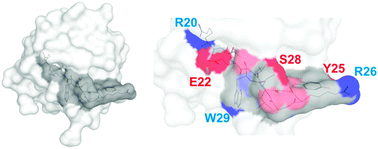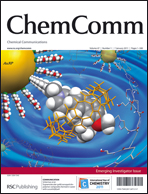The pattern recognition molecule deleted in malignant brain tumors 1 (DMBT1) and synthetic mimics inhibit liposomal nucleic acid delivery†
Abstract
Liposomal nucleic acid delivery is a preferred option for therapeutic settings. The cellular pattern recognition molecule DMBT1, secreted at high levels in various diseases, and synthetic mimics efficiently inhibit liposomal nucleic acid delivery to human cells. These findings may have relevance for therapeutic nucleic acid delivery strategies.


 Please wait while we load your content...
Please wait while we load your content...